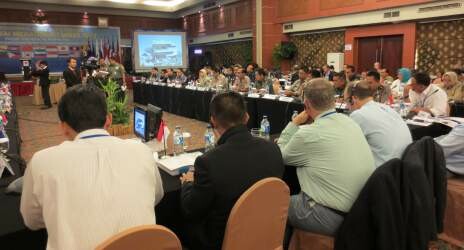
The Island of Sumatra has suffered several large-scale natural disasters over the past decades, and received particular attention after the devastating 2009 earthquake in Padang. To better anticipate and prepare for the effects of future disasters and to lessen their human impacts, the Government of Indonesia is strengthening local, regional and national capacities to respond to disasters.
Lucia Cipullo, Disaster Law Programme Legal Officer for Asia Pacific, delivered a presentation to the high-level group on the “Guidelines for the Domestic Facilitation and Regulation of International Disaster Relief and Initial Recovery Assistance” (IDRL Guidelines) as a key preparedness tool for governments. Following this, much of the Table Top Exercise focused on enhancing the mechanism for receiving international assistance, both civil and military, as well as improving early warning systems and the emergency command system.
IDRL issues featured prominently during the week, with lively discussions around the process for requesting or ‘welcoming’ international assistance, the entry and mobilization of international search and rescue teams, the importation of relief items, the logistics and distribution of relief goods and the termination of international assistance. Members of the international community, such as the Japanese Mission to ASEAN, the Singapore Civil Defence Academy and the Australian Agency for International Development (AusAID) were on hand to share experiences and lessons learned from previous disasters.
Questions concerning the coordination of international relief were also high on the agenda, with a focus on coordination among provincial, national and international actors. “We need to improve coordination in order to be effective,” remarked Oliver Lacey Hall, Head of UN OCHA’s Regional Office for Asia Pacific. “The most important coordination happens at the site of the disaster, and we need to ensure that both horizontal and vertical coordination takes place.”
“This exercise reminded us how important it is to work well with other actors, and how we can better coordinate international assistance,” echoed Pak Arifin Mud. Hadi, Head of Disaster Management of the Indonesian Red Cross Society (Palang Merah Indonesia, or PMI). “It is useful to conduct these exercises to evaluate and learn from past operations, to harmonize coordination, and to highlight the role of the Red Cross,” he noted. Pak Arifin also emphasized how these exercises help to achieve synergies between different sectors involved, facilitating a more comprehensive and effective response.
The Disaster Law Programme is currently working with PMI on a study examining the impact of improvements to Indonesia’s legal framework for disaster management and response. This event provided timely insight into how the procedures contained in the law and regulations are playing out in practice. It is anticipated that the study report will be issued in late 2013.